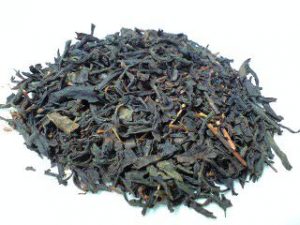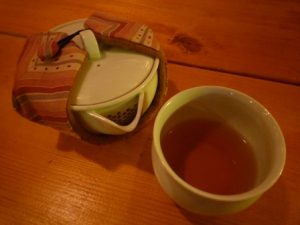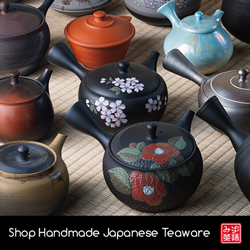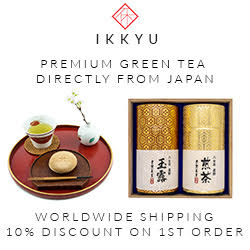 Wakoucha (和紅茶) is the term for black tea that was harvested and processed in Japan.
Wakoucha (和紅茶) is the term for black tea that was harvested and processed in Japan.
Japanese black tea isn’t known much outside Japan, but I’m sure that it will slowly become more popular as time goes by.
“Wa” refers to Japan and “koucha” literally means “red tea“.
You’ll find that this black tea is quite different from those produced in other countries such as India.
This has to do with the tea cultivars used, as well as Japan’s climate and soil conditions.
Characteristics of Japanese black tea
 In general, Japanese black tea has low astringency and is mild enough so as to be drunk without milk or sugar.
In general, Japanese black tea has low astringency and is mild enough so as to be drunk without milk or sugar.
It actually pairs well with Japanese food and sweets.
The tea cultivars used are either those used for Japanese green tea (mainly Yabukita), and cultivars specifically meant for black tea production such as Benifuuki.
While I’m not sure how prevalent this practice is, I’ve read that some farmers harvest their first flush to produce green tea, and later flushes are used for black tea.
Apparently, later flushes are better suited for black tea, and probably fetch a better price too 🙂
While guidelines vary, the brewing method basically consists of water at high temperature and long steeping time.
The history of wakoucha
Surprisingly, Japanese black tea has a long history. Japan has even exported black tea in the past!
During the Meiji Restoration (1868 to 1912), the government decided that Japan should produce black tea because it was valued in Europe and America. Hence the first attempt was made with the help of Chinese tea specialists, but unfortunately the resulting black tea didn’t have a good enough quality.
Later on thanks to Tada Motokichi, better quality tea was made through techniques from India as well as tea plants from the assamica variety. This marked the beginning of Japan’s development of cultivars meant for black tea production in Japan.
The decline of Japanese black tea production happened in 1971 when the liberalization of imports took place. Reduced tariffs meant more competition from imported black tea (the Japanese had been drinking black tea by then, and they still do so, although not as much as green tea) and Japanese farmers just couldn’t keep up with the way that markets had changed.
It wasn’t until recent years that Japanese black tea production was revived.
Now the focus is on black tea that is distinctly Japanese, and the hope is for it to be recognized internationally as well.
Have you tried Japanese black tea? And if so, did you like it?





January 8, 2014
Thank you for your post! I have never heard before that there is a Japanese black (red) tea. I would really like to taste it.
January 8, 2014
Thanks for the comment Josho.
You should definitely try it when you get the chance.
January 9, 2014
Thanks for your explanation on Googleplus. I lost your notification so thanks. Be nice to try this sometime.
January 9, 2014
Hello Robert.
Thank you for leaving a comment here : ) I’ll make sure to post a review of a Japanese black tea in the future.
January 9, 2014
I didn’t know about the “wa” in front of “koucha”. I just always called it “kocha”. I’ve had, oh, three Japanese black teas so far. They’re “meh”.
January 9, 2014
Hi Geoff
Koucha is the way the Japanese normally say “black tea”, so you’re not mistaken.
I’m don’t drink much black tea, so I can’t really tell you if the two I’ve tried so far are very good or not : )
Trying more types of tea is one of this year’s goals.
January 10, 2014
I’ve never tried black Japanese tea before. Where did you purchase it from?
January 11, 2014
Hi Griff
The first time I tried it in a cafe in Japan, but don’t recall the name.
The other one was given to me as a gift from a Japanese friend, the brand is Creha.
You can buy this and other different brands of Japanese black tea from Yunomi.life
January 20, 2014
I work for a Japanese tea supplier in Seattle. I have some additional information for you.
Okinawa Tea Factory (www.okitea.com) produces outstanding koucha in the southern-most prefecture Okinawa, Japan. The soil and climate is perfect for cultivating quality Koucha.
January 20, 2014
Dear Hiroko
Thanks for the information!
I’m also aware of teas from Sugimoto America. Feel free to email me through my contact page in case you’re interested in a tea review.
April 20, 2015
thanks for your help in finding this on a recent visit to Japan. I’ve only been back a few days and haven’t tried that tea yet, but I’ll pass on what I thought of it when I do. it’s always odd forming a judgment of a type of tea based on trying one, or even two or three, but you have to start somewhere, and trying three versions of a relatively rare type of tea is a lot.
April 20, 2015
Hi John
Thank you for your comment. I’m glad that I was able to help.
I’ll be looking forward to your review of the Japanese black tea.
March 15, 2022
What a great article, I love your whole website and learn so much from it, even I am located in Japan and learn directly at the tea fields. Still, your cultivar list as well as the introduction of Japanese Black Tea are fantastic and irreplaceable. The day before I had Benifuuki wakoucha, it was delicious! Cheers
March 15, 2022
Hi Josko
Thank you for your comment.
Glad that you enjoyed the Benifuuki wakoucha and this site.